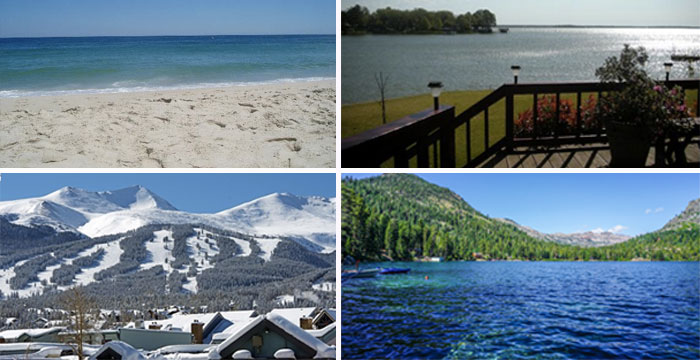
Thinking of a Vacation Home? Here Are Some Things You’ll Want to Know

Spring is finally here and as the weather continuing to get warmer; do you find yourself thinking about a vacation? As you dream about venturing to that ideal destination make sure you also dream about the process of packing luggage, long flights and crowded hotels. What if you vacation became more permanent? Have you been wondering how much fun a beachfront or vacation home might be but really haven’t gotten too deep in the details?
A vacation home is considered a “non-owner occupied” property and you’ll need a down payment of at least 20% when using conventional financing. However, there are other options with lower down payments as long as the property is considered a vacation, or second home and not primarily used as a rental property. For income tax purposes, a second home becomes an investment property if the unit is rented out for more than two weeks each year.
Many people assume they must own a primary residence before owning a vacation home, but this isn’t a rule you must follow. What’s really important is matching your housing choices to your lifestyle.
You may live in a city and want lots of space that you can’t afford there. You could rent a modest condo in the city, and buy a large vacation home outside the metro area.
When buying a vacation home you’ll need to get your financial affairs in order just as you did when you bought the home you’re in now. Your lender will ask for income information such as pay check stubs, W2 forms and income tax returns. And unless you own other investment properties, don’t expect to be able to use any current rental income in order to help qualify for a mortgage. Lending guidelines ask there be some landlord experience as evidenced by federal income tax returns.
Speaking of renting, that’s one of the advantages of buying a vacation home. Your rental income will more than enough cover the mortgage and property taxes as well as provide some monthly cash flow. Yet you decide when and if you want to rent it out and for how long. If you intend to use the property frequently, you can limit the times when the property is rented out. And, if you don’t care to be a landlord and collect the rent, maintenance and finding renters, there are property managers who will, for a small fee, do all the landlord work for you. All you have to do is show up when you’re ready for an escape.
For those that are soon to retire, buying a vacation home near where they intend to retire can be an excellent financial planning tool. You can buy a beach home now, collect the monthly rent and watch your equity grow over time. When you finally decide to move into your beach home and retire, the proceeds from the sale of your current residence can be used to pay off the remaining mortgage balance on the beach home and you can retire mortgage-free. All the while, your property taxes and mortgage interest on the financing is tax deductible. And speaking of tax deductions, you can also deduct any property management fees as well travel expenses going to and from the property for maintenance purposes.
There are specific rules regarding rental properties and income taxes so make sure you meet with an income tax specialist or financial planner who can explain the various guidelines as it relates to your tax bill. But once you have your questions answered, it’s time to start shopping for your very own vacation spot.